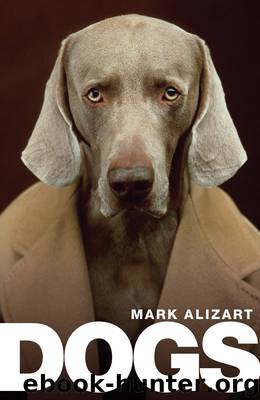Dogs by Mark Alizart

Author:Mark Alizart
Language: eng
Format: epub
Publisher: Wiley
Published: 2019-10-16T16:00:00+00:00
Portrait of the Philosopher as a Dog
Some masters, all too aware of the frightening speed at which dogs pass away, replace them as they approach the end of their lives, often with a dog of the same breed. Sometimes they even give the successor the same name (as in the case of Yves Saint Laurent’s Bulldog, of which there have been four generations, almost four ‘models’: Moujik, Moujik II, Moujik III, and Moujik IV). In this way they are accompanied throughout their entire lives by a sort of unique dog, a generic dog whose unchanged form receives multiple transmigrated souls. Although it may seem barbarous, and even though I personally cannot bring myself to do it, it seems to me that this is an appropriate way to respect the dog’s particular relation to time.
Many grieving dog owners feel as if they have lost a child, but in my own experience it has felt more like being orphaned, as if it were not a child I had lost, but a parent. It is difficult to think of any way to describe the pain of someone who has lost a child, there is no word for it in English. But there is another cause for feeling that one is the ‘orphan’ of a dog: it’s that the dog is perhaps just as much a father or mother as it is a child, and one would be more correct to call it affectionately ‘dada’ or ‘mama’ than ‘little darling’ or ‘baby’.
In Thy Servant a Dog, Kipling has Boots and Slippers, his little Scottish Terriers, say that they ‘help’ the master to smoke his pipe or to read his newspaper. Along the same lines, I like to think that the dog is the animal that ‘helps’ us to be, throughout our entire lives. The dog is a mother to us. Another myth, one that would have grabbed Freud’s attention, tells us as much: the myth of the wolf child, the orphan raised by a female dog.
We all know the story of the founding of Rome, the city that claimed to be the cradle of humanitas. It involves two twins, just like Xolotl and the Koma-Inu: Romulus and Remus, children of the god Mars and of a vestal, Rhea Silvia. Snatched by Silvia’s brother and cast adrift on a river, these twins are retrieved at the foot of the Palatine Hill by a she-wolf, who raises them until they are old enough to avenge themselves of their uncle and found a city. The story is more complicated, however, since the Latin noun for ‘she-wolf’, lupa, also means ‘prostitute’. But is this so surprising? We have seen this analogy between dog and woman crop up again and again. And now perhaps we begin to understand its meaning: it concerns in particular the pregnant woman, who resembles a dog insofar as she is also a membrane, a placenta. She is guardian of the frontier that runs between excess and void, from which all life proceeds. In Greek,
Download
This site does not store any files on its server. We only index and link to content provided by other sites. Please contact the content providers to delete copyright contents if any and email us, we'll remove relevant links or contents immediately.
Cecilia; Or, Memoirs of an Heiress — Volume 1 by Fanny Burney(32559)
The Great Music City by Andrea Baker(32020)
Cecilia; Or, Memoirs of an Heiress — Volume 2 by Fanny Burney(31957)
Cecilia; Or, Memoirs of an Heiress — Volume 3 by Fanny Burney(31943)
We're Going to Need More Wine by Gabrielle Union(19049)
All the Missing Girls by Megan Miranda(16033)
Pimp by Iceberg Slim(14513)
For the Love of Europe by Rick Steves(14140)
Bombshells: Glamour Girls of a Lifetime by Sullivan Steve(14077)
Talking to Strangers by Malcolm Gladwell(13374)
Norse Mythology by Gaiman Neil(13371)
Fifty Shades Freed by E L James(13244)
Mindhunter: Inside the FBI's Elite Serial Crime Unit by John E. Douglas & Mark Olshaker(9345)
Crazy Rich Asians by Kevin Kwan(9293)
The Lost Art of Listening by Michael P. Nichols(7507)
Enlightenment Now: The Case for Reason, Science, Humanism, and Progress by Steven Pinker(7315)
The Four Agreements by Don Miguel Ruiz(6766)
Bad Blood by John Carreyrou(6623)
Weapons of Math Destruction by Cathy O'Neil(6282)
